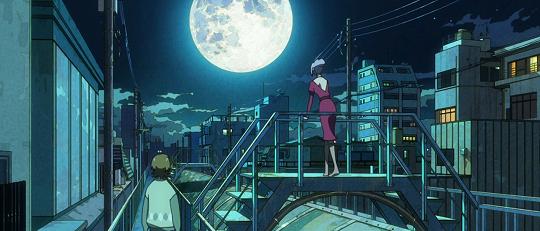There’s something to be said for actually missing a show when you’ve finished watching it. Uchouten Kazoku (The Eccentric Family) left a small, peculiarly shaped hole where it once occupied my regular viewing. There’s nothing outwardly distinguished about the show - Kyoto is very pleasantly rendered, every character is well drawn and the story is quietly unique - but something about its structure and pacing lends itself to the same familiarity that lies at the heart of the titular eccentric family.
Focusing on the triumvirate of tanuki, tengu and human society - the lead is taken by Yasaburo, a teenage tanuki layabout who splits his time between transforming into various human guises and looking after the curmudgeonly old tengu, Yakushibou. It transpires that shortly before the events of the series, the father of Yasaburo and his three other sons passed away via, what is for tanuki, natural circumstances.
“Events” is perhaps too strong a word for how the series starts which is lackadaisical and content with gently unfurling the relationships and idiosyncrasies of each of the cast. The meat of the story is contained in the latter half of the episodes and concerns the succession of a tanuki into the role left by Yasaburo’s father, specifically the leader of Kyoto’s tanuki, the Nise-emon. This necessitates the introduction of another family, the almost cartoonishly villainous Ebisugawa, once a branch family of Yasaburo’s Shimogamo lineage.
This is all primarily academic though when it becomes readily apparent that the setup may be quirky and the story rooted in Japanese ancestral hierarchy, but the heart of the series is in the relationships between the characters and the bonds that extend between family members. Yasaburo, the third son, is easy going, his eldest brother is practical but excitable, his youngest brother is timid and easily spooked while the second son lost the innate tanuki ability to transform and now resides as a frog in a well.
It’s wonderfully off-the-wall but gradually, piece by piece, the common whimsy is revealed to be reflective of deeper, more personal tribulations. The mother’s fear of thunder (meted out by the god Raijin) is not just a character quirk just as the Yakushibou’s belligerence isn’t just old-man bluster.
Then there’s Benten.
Her shadow looms as large as Yasaburo’s father’s does, yet her’s is tinged with menace and tempered by capriciousness. Her ability to fly like a tengu belies her humanity but a large portion of the early episodes are spent in polite fear of what she is capable of. Gifted by only the lightest of touches with back story, she conceals a profound sadness behind an abundance of courtesy and muted charisma. It is only by comparison that her fickle complexity isn’t allowed to bog down the story and it’s left to the tanuki and their “idiot blood” to facilitate the pivot from melancholy soliloquies in the moonlight to a rumpus in an izakaya with a tiger, a frog, a tengu and a lorryful of tanuki jostling for floor-space.
Benten exists in the penumbra between the ordinary, technology driven human world and the spiritual, mythological world of shapeshifting tanuki and flying tengu. She is the bridge between those two communities and is emblematic of the hidden places in every city. She regularly drags Yasaburo to spots like a sunken clock tower peeking out of a lake, a hidden cocktail bar only accessible via rooftop gantries, and the secret meetings of an ominously titled organisation. Her allure is that of the mystical while her silent tears falling into a well is that of humans. The series may be set in Kyoto with its village atmosphere in a city locale, but it is more about the unseen passageways and secret areas than Kyoto as a character, regardless of the eyecatch maps.
It’s undoubtedly an odd mixture: a family coming to terms with a death, the story of inter-family squabbles escalating into animosity and a theme of the loss of wonder in a modern world. That and an alcohol fuelled, rocket powered tea room and a proliferation of lucky cats and daruma dolls. The poignance that Uchouten Kazoku exhibits in the midst of all of this is disarmingly clever but underpins a quiet and captivating series that is innocuous enough during watching but, only in retrospect, is sorely missed by its absence.












